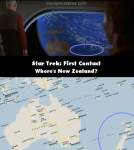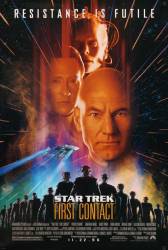Factual error: In the scene where Troi is drunk and Riker asks if Cochrane can accept the truth, it is night. Then the scene switches to the Enterprise orbiting Earth over north America and it is apparently daytime because the sun is shining over north America, where the movie takes place. (00:31:05)

Factual error: In the scene where Picard opens a viewing port and shows Lilly that she is in a starship orbiting Earth he shows her New Guinea and Australia. New Zealand is missing. (00:42:45)
Suggested correction: Actually when you look at Australia and New Zealand from orbit, New Zealand is a lot further away from Australia then shown on a map, also a lot more south of Australia. A map is a 2D image of a sphere, causing proportions to be off (its well known Africa is a lot smaller on maps than it is in real life). Especially the further south or north you go distances are way off. The depiction shown in the movie is actually correct, in that angle New Zealand is just outside of the frame. There are plenty of pictures from orbit to compare.
Factual error: In the scene after Zefram's ship goes to warp, when the ship is being turned around to return home, Cochrane remarks "Is that the Earth? It's so...small." He wouldn't have been able to see it, provided the distance the ship just flew. Warp 1 is the speed of light and in a 1 minute flight, the Phoenix would have travelled over 10 million miles - at that distance the earth would just appear like a bright star.
Factual error: When Zephram Cochrane, Riker and LaForge activate the warp drive of the prototype starship Phoenix, the prismatic starscape is seen streaking past (same effect as in the Star Trek: TNG series). However, the Phoenix never leaves the solar system or even the vicinity of Earth, achieving only Warp One (the max velocity of the Phoenix) for a few seconds. Even at lightspeed, the Phoenix did not enter interstellar space nor pass any other stars; therefore, the starscape should have remained almost motionless.
Suggested correction: What happens when a ship goes to warp it essentially creates a subspace distortion. This causes the starscape to change and move, as they exit regular space and enter subspace.
At Warp One, there should be zero prismatic distortions. It takes a full 24-hour DAY for light to cross the solar system. In a few seconds, a vessel traveling at Warp One, within a solar system, would see no distortions.
A ship slips out of regular space when going to warp, it creates a bubble around the ship, that bubble causes the starscape for the people inside it to appear moving or at least distort. That's what you see. That's what you always see when a ship goes to warp.
The prismatic effect was created for the TNG series to depict the ship passing stars at hundreds of times the speed of light. The Phoenix only achieved Warp One, one time the speed of light (lightspeed). As fast as that sounds, it wouldn't be fast enough to create any visual distortion.
Even at hundreds of times the speed of light you would only pass a star every few seconds, they didn't make that effect for TNG as in TOS they were going that fast too (as high as warp 9) and the same distortion is seen. You also keep saying its the speed that causes the visual distortion whilst I specifically mention its the fact the ship exiting regular space and into subspace is whats causing the distortion.





